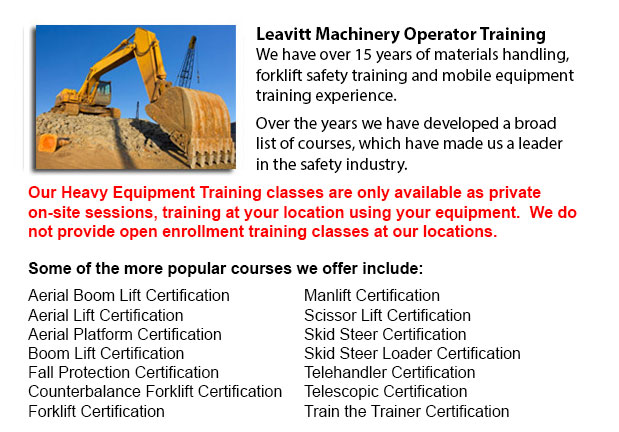
Saskatchewan Heavy Equipment Training - The two most common types of heavy equipment training are categorized into the categories of equipment; equipment which is fashioned with rubber tires or those with tracks. The tracked vehicle are heavy duty machines like bulldozers, excavators and cranes. They make up the most common type of heavy equipment training. Usually, the rubber tire training involves the rubber-tired kinds of end loaders, cranes and earth movers. Heavy equipment training likewise involves utilizing various vehicles with rubber tires such as dump trucks, graders and scrapers. Training centers usually provide truck driver training for the different types of heavy equipment training.
The majority of all heavy equipment runs on diesel fuel and as such, the basics of diesel mechanics are a major part of heavy equipment training. Usually, a basic course on diesel mechanics is typically required of those training. Amongst the main goals of the course are to be able to educate an operator about basic troubleshooting and maintenance procedures in the event of a problem with the machinery. Normally, this training saves a mechanic from being called out in the middle of the night just because a piece of equipment requires the addition of something minor like for example engine oil. Diesel mechanics for heavy machines is an education all unto its own; hence, extensive training is not usually offered in the course book for the general training program.
There is a wide variety of courses for training operators on heavy machines. The more intensive training courses offer both hands-on equipment operations combined with classroom experience, providing a good amount of training and knowledge for students. Many programs offer both a a heavy machine certification upon program graduation and a diploma upon graduation. Training related to safety is a huge part of all training. Programs like crane school, which includes overhead lifting as well, consist of radio receiving and transmitting programs and hand signal courses during the training. This training is vital because lots of operators of cranes and forklifts lift and place equipment and pallets that they are unable to see. The majority of crane operation is done by an operator receiving hand signals from someone on the ground.
There are several places where heavy machine colleges have opened that focus on heavy equipment operator education. A lot of the training for the heavy equipment is accomplished by the military. There are various former military instructors who teach courses in a civilian training class. There are various heavy equipment training schools which operate and own gravel businesses and they can have their students trained in an actual working quarry. There are other programs that rent space within a working quarry instead. These courses provide the quarry with labor which is free whilst the students are practicing and operating machines.
-
Saskatchewan Forklift Training School
Saskatchewan Forklift Training School - Forklift Training School - Federal and industry regulators have established the criteria for forklift safety training according to their current standards and regulations. Those wishing to operate a forklift sh... More -
Saskatchewan Scissor Lift Ticket
Saskatchewan Scissor Lift Ticket - The scissor lift truck has been a great benefit to many businesses since the effort and manpower to run one of these machines is very minimal. Furthermore, numerous workplace injuries have been avoided by having one... More -
Saskatchewan Crane Operator Classes
Saskatchewan Crane Operator Classes - For the supervisors and the operators, new and current, the crane operator training course is suitable for all. Course content addresses relevant provincial, state and federal safety regulations. The first part o... More -
Saskatchewan Manlift Training
Saskatchewan Manlift Training - There are many manlift training courses that offer a review of the manlift equipment. The practicum part of the training is another important portion of the program. In this section the trainee has chance to demonstrat... More -
Narrow Aisle Forklift / Order Picker Training / Electric Pallet Jack / Electric Pallet Truck Training in Saskatchewan
A pallet lift is a device built principally for moving pallets of irregular weights and sizes. They can be used in conjunction with cranes, platform lifts and other heavy duty machines as an appendage piece or to be used on their own. Pallet hoists a... More -
Saskatchewan Telehandler Training Courses
Saskatchewan Telehandler Training Courses - The employer has the responsibility to make certain that their employees are trained to work proficiently using telehandler machinery. The personnel should be assessed for their ability to utilize the equip... More -
Saskatchewan Heavy Equipment Training Schools
Saskatchewan Heavy Equipment Training Schools - There are many heavy equipment training schools to pick from. If you want to get to the best, it is important to check several factors of the school to be able to ascertain the level of education you wi... More -
Saskatchewan Crane Training Schools
Saskatchewan Crane Training Schools - We have designed numerous Mobile Crane Operation programs at our Crane Training Schools. These programs are recommended for the skilled operator who needs re-certification or certification, and for inexperienced... More

Forklift Certification Saskatchewan
TOLL FREE: 1-888-254-6157
Regina, Saskatchewan
forkliftcertificationsaskatchewan.com
Email Us
About Us


